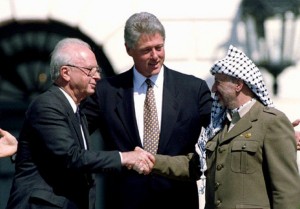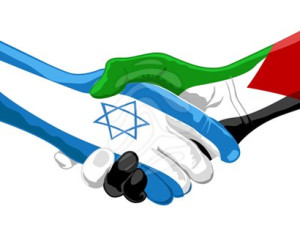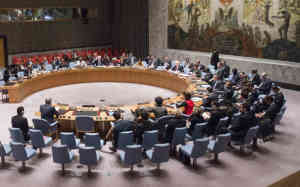Gershon Baskin thinks that the Palestinians should issue a unilateral declaration of peace between the State of Palestine and the State of Israel, which would transform the Israeli-Palestinian conflict into a state-to-state dispute that would be more easily accepted by the nations of the world and the members of the UN Security Council.

Former prime minister Yitzhak Rabin, former US president Bill Clinton, and the late PLO leader Yasser Arafat on the White House lawn.. (photo credit:REUTERS)
We are way beyond that point, yet life and relations between the two sides are still guided by the same Oslo agreements, which for quite some time have no longer met the requirements of day-to-day life.
The proposed move by Abbas is extremely bold and very risky. It is the kind of thing that the Jews would have considered doing if the situation was reversed, but in the end, the Zionist movement’s overarching, pragmatic strategy would have declined to implement a move that would have such deep negative repercussions for their own people.
Even if in reality little remains of the Oslo agreements, day-to-day relations between Israel and the Palestinians is still governed by them. The Palestinians have no external borders that they control.
They must interact with Israel. People and goods cannot move without Israeli cooperation. All Palestinian imports and exports go through Israel’s borders where Israel continues to collect customs duties for the Palestinians, transferring those revenues to the Palestinian budget. Some 80 percent of the goods and services bought by Palestinians are purchased in Israel, where VAT is paid and then returned to the Palestinian state budget. Some 50% of the Palestinian budget come from revenues collected by Israel and transferred to the Palestinians.
Palestinians purchase almost all of their electricity from Israel and most of their water also comes from Israel as well. Palestinian physical movement in and out of the country is largely facilitated due to the security cooperation with Israel. A lot of the Palestinian radicals whose activities could drive Palestinian society into the next round of violence are stymied as a result of that security cooperation.
It seems that the Palestinian intent is to declare these agreements null and void, declare that the State of Palestine is an occupied state and that thus the international community needs to take action to end the occupation. If Palestine were a member of the United Nations and if then they declared Palestine an occupied state, the US Security Council would have no choice but to take direct action.However, Palestine is only an observer state in the UN and the Security Council would not be automatically required to act. It could, if the members wished to do so, but there is no automatic obligation.
This is a dangerous and risky step that will require an enormous amount of internal Palestinian solidarity and preparedness to absorb a lot of suffering during the coming years. I am not sure that the Palestinian public fully understands the dimensions of the price which Israel can and probably will extract from the Palestinian leadership and people due to this bold unilateral move. That price could easily lead to a spiraling of unintended consequences in the form of a new intifada and extreme and costly violence. Both societies would pay dearly for that, but Palestine would pay more, as it did in the first two intifadas.
There is a possible way to mitigate the negative impact of a Palestinian unilateral declaration. My advice, if it is decided to cancel the Oslo agreements, would be to not only to cancel them but to also declare unilateral peace.

The Palestinians should issue a unilateral declaration of peace between the State of Palestine and the State of Israel
If the Palestinians were to adopt this dual unilateral approach they would transform the Israeli-Palestinian conflict into a state-to-state dispute which could then be more easily accepted by the nations of the world and the members of the Security Council. The strategy would have a greater chance of producing positive results faster – predicated on refraining from violence. A strategy which only cancels the existing agreements and offers no positive and constructive path would most likely be destructive and while it might eventually succeed, the price would be unbearable. The coupling of the initiative with a Palestinian declaration of peace and a peace offensive would more likely be a winning strategy.
This insight is directed primarily to my Palestinian readers. I will make efforts to have it translated into Arabic and published in one of the Palestinian daily newspapers as well.



